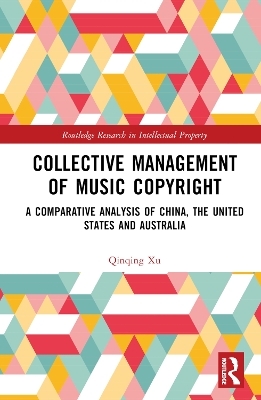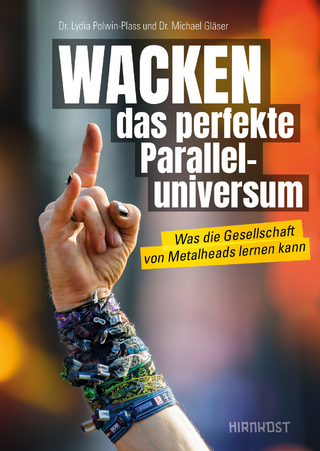
Collective Management of Music Copyright
Routledge (Verlag)
978-1-032-28102-5 (ISBN)
The third amendment of the Chinese Copyright Law was initiated in 2011 and came into effect in June 2021 after a long debate for almost ten years. The discussion of the third amendment has highlighted the controversial topic of collective management of copyright. This book explores the adequacy of the MCSC as an intermediary representing rights for music creators. The main argument developed in this study is that the work of the MCSC for individual composers and lyricists is hampered by shortcomings in the regulatory regime as well as by a lack of members’ rights to participate in the management of their own rights and by the ineffective international cooperation between the MCSC and other musical CMOs overseas.
The analysis is undertaken through a case study approach, comparing the collective management systems of music copyright in China, the United States and Australia and addressing the question of how musical CMOs operate in these countries. Specifically, three perspectives are examined: the regulatory systems designed to limit the misuse of those CMOs’ monopoly, members’ rights in the organisations, and international cooperation between these CMOs.
Overall, the main findings of this book suggest that the MCSC in China could work more effectively to protect music creators’ interests. In contrast, although the operational frameworks of the American Society of Composers, Authors and Publishers ('ASCAP') and the Broadcasting Broadcast Music, Inc. ('BMI') in the United States and the Australasian Performing Right Association ('APRA') in Australia are not perfect models, the systems in these two countries may at least provide reference points for potential improvement of the regime of the MCSC. The research recommends three courses of action: strengthening the regulatory design overseeing the MCSC’s monopoly, clarifying the relationship between the MCSC and its members while providing the members with the right to manage their own copyright, and improving the international cooperation between the MCSC and CMOs in other countries.
Dr Qinqing Xu is a lecturer in Intellectual Property Law in the Law School at Durham University, the United Kingdom. Qinqing obtained her PhD degree with Distinction (Examiners’ Commendation for Outstanding Thesis) from the University of Wollongong, Australia. She also completed a Bachelor of Law with Distinction and a Bachelor of Arts, and a Master of Law with Distinction. Qinqing’s research interests focus on copyright, including music copyright, and widely cover other topics such as intellectual property issues related to gaming and intangible cultural heritages. She is also interested in comparative law, business law and international
Tables
Acknowledgements
List of Names and Abbreviations
1 Introduction
1.1 Background
1.2 Significance of the Project
1.3 Scope of the Study
1.3.1 Effective Regulatory System on Musical CMOs’ Work
1.3.2 Individual Members’ Rights in a Musical CMO
1.3.3 International Cooperation Among CMOs
1.4 Why China, the United States and Australia?
1.5 Structure of the Chapters
2 Copyright and Collective Management in the Digital Era
2.1 The Rationale of Copyright
2.1.1 The Origins of Music Copyright
2.1.2 International Development of Copyright Protection
2.2 Copyright in the Digital Environment
2.2.1 Changes and Challenges of Copyright
2.2.2 Functions of Copyright and Its Changing Roles
(a) Balances Between Copyright, Creation and Private Rights
(b) Adaptation of Copyright Rules to the Digital Environment
2.2.3 Authors’ Weak Position in the Music Industry
2.3 Protecting Music Copyright in the 21st Century: The Role of CMOs
2.3.1 The History and Development of Collective Management
2.3.2 Functions of Collective Management Organisations
(a) Benefits Brought by CMOs
(b) Limitations of Collective Management
2.3.3 Individualism, Fragmentation and Collectivisation
2.4 Collective Management in the Digital Age
2.4.1 Rights Management Methods in the Digital Environment
2.4.2 Collective Management Is Needed in a Digital World
2.5 Conclusion
3 The Collective Management of Music Copyright in China, the United States and Australia
3.1 Collective Management of Music Copyright in China
3.1.1 The Development of Copyright in China
3.1.2 Regulatory System on Collective Management of Copyright
(a) Early Development of Collective Management Rules
(b) Structural Designs of the Chinese Collective Management System
3.1.3 The Operations of the Musical CMO in China – the Music Copyright Society of China
3.2 Collective Management of Music Copyright in the United States
3.2.1 The Musical CMOs in the United States
3.2.2 Regulatory Constraints on Activities of ASCAP and BMI
3.3 The Rules on Collective Management of Music Copyright in Australia
3.3.1 Operations of the Australasian Performing Right Association
3.3.2 Regulatory Regime on Collective Management of Music Copyright in Australia
3.4 Three Countries, Three Models: Collective Management of Music Copyright in China, the United States and Australia
3.4.1 Public Policy Approaches to Regulation of CMOs
3.4.2 Legal Nature of CMOs
3.4.3 Different Types of Regulatory Rules and Scrutiny From the Relevant Authority
3.4.4 Issues Identified About the MCSC From the Analysis
3.5 Conclusion
4 Addressing the Monopolistic Powers of the MCSC
4.1 Deconstructing the Monopolistic Powers of the MCSC
4.1.1 Regulatory Framework of the MCSC’s Monopoly
4.1.2 Monopolistic Issues of the MCSC Resulting From Inadequate Supervision
4.2 The Regulatory Regime on Musical CMOs in the United States
4.2.1 Antitrust Enforcement in Collective Management of Music Copyright in the United States
4.2.2 Consent Decrees in the Context of Musical CMOs
4.3 Regulatory Scrutiny of the Australian Musical CMO
4.3.1 The Work of the Australian Competition and Consumer Commission and the Copyright Tribunal
(a) The ACCC’s Authorisation of APRA’s Operations
(b) Copyright Tribunal’s Participation
4.3.2 The Code of Conduct for Copyright Collecting Societies
4.4 Towards a More Effective Collective Management of Music Copyright in China
4.4.1 Improving the Regulatory Rules to Regulate the Monopoly of the MCSC
(a) Debates on the Impact of the Numbers of CMOs in Limiting Their Monopoly
(b) Applicability of Antitrust Rules to Regulate the MCSC Is Not Desirable
(c) Improvements of the RCCA
4.4.2 Clarifying the Supervisory Authorities’ Roles
(a) Problems Exist: Weak NCAC Supervision
(b) Clarifying the Work of the Supervisory Authority
4.5 Conclusion
5 Members’ Participation in the Management of Their Copyright in the MCSC
5.1 MCSC Members’ Rights in China
5.1.1 The Legal Nature of the Relationship Between the MCSC and Its Members
(a) Debates About the MCSC-Member Relationship and ‘Unclear Trust’ in the Chinese Context
(b) The Trust Relationship Applied to the MCSC
5.1.2 Exclusive Licensing to the MCSC
(a) Exclusivity of MCSC Operations
(b) Music Creators and the Right to License Their Works
5.2 Rights of the Members in ASCAP and BMI in the United States
5.2.1 Categories of Membership
5.2.2 Individual Members’ Rights in Musical CMOs
5.2.3 Members’ Individual Licensing Options
(a) Direct Licensing Options for Members in the Musical CMOs
(b) Issues of Partial Withdrawals
5.3 Rights of Members of APRA in Australia
5.3.1 Assignment of Members’ Performing Rights to APRA
5.3.2 Members’ Rights to License Music Copyright Directly
(a) ‘Opt Out Clauses’
(b) ‘Licence Back Option’
5.4 Building a More Inclusive Model for MCSC Members
5.4.1 Clarifying the Relationship Between the MCSC and Its Members
5.4.2 Direct Licensing Needed From MCSC Members
5.5 Conclusion
6 Collective Management of Music Copyright in Global and Digital Contexts
6.1 Challenges of Global Music Copyright Protection in a Digital Environment
6.1.1 The Music Industry and International Trade in a Digital Environment
6.1.2 Territorial Limitations of Current Copyright Rules
6.2 Undeveloped International Music Copyright Protection
6.2.1 Digital Protection of Music Copyright in China
6.2.2 Cooperation Between the MCSC and Musical CMOs Overseas
6.3 International Copyright Management Models
6.3.1 Inadequate International Standard Musical Work Code Initiated
6.3.2 Failure of the Global Repertoire Database
6.3.3 Potential Improvements in Current International Practice
6.4 Conclusion
7 Conclusion
7.1 Major Findings and Recommendations
7.1.1 Deficiencies in the Collective Management of Music Copyright in the Chinese Context
7.1.2 Improving the Music Copyright Collective Management System in China
7.1.3 Contribution to a Healthier Environment for Music Creation and Industries
7.2 Hope for the Future
Bibliography
A Articles/Books/Reports
B Cases
C Legislation
D Treaties
E Other
Index
| Erscheinungsdatum | 29.03.2023 |
|---|---|
| Reihe/Serie | Routledge Research in Intellectual Property |
| Zusatzinfo | 3 Tables, black and white |
| Verlagsort | London |
| Sprache | englisch |
| Maße | 156 x 234 mm |
| Gewicht | 440 g |
| Themenwelt | Kunst / Musik / Theater ► Musik ► Allgemeines / Lexika |
| Recht / Steuern ► Allgemeines / Lexika | |
| Recht / Steuern ► EU / Internationales Recht | |
| Recht / Steuern ► Wirtschaftsrecht ► Urheberrecht | |
| ISBN-10 | 1-032-28102-2 / 1032281022 |
| ISBN-13 | 978-1-032-28102-5 / 9781032281025 |
| Zustand | Neuware |
| Informationen gemäß Produktsicherheitsverordnung (GPSR) | |
| Haben Sie eine Frage zum Produkt? |
aus dem Bereich


